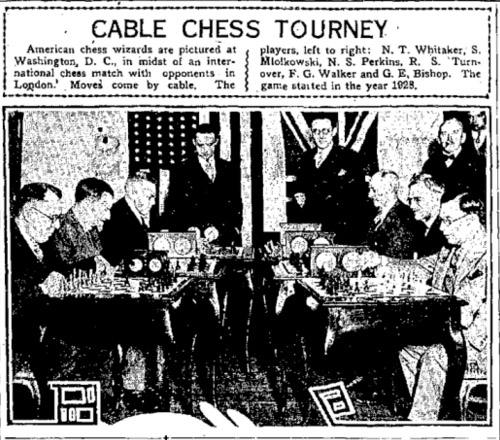BRITBASE - British Chess Game Archive
Tournament: Insull Trophy, Washington-London Cable Match • 6 out of 6 games
Venue: RAC Club, London / Washington • Dates: 12 April 1930 • Download PGN • Last Edited:
Monday 16 December, 2024 3:45 PM

Photo from The San Antonio Light, 8 May 1930, showing the Washington players. Left to right: Norman Tweed Whitaker, Stasch Mlotkowski, Nelson Secor Perkins, Isador Samuel Turover, Frank Baker Walker, GE Bishop.
| Bd | London | 12 April 1930 | Washington |
|---|---|---|---|
| 1w | Fred Dewhirst Yates | ½-½ | G E Bishop |
| 2b | Sir George Alan Thomas | 1-0 | Norman Tweed Whitaker |
| 3w | Reginald Pryce Michell | ½-½ | Nelson Secor Perkins |
| 4b | William Winter | 0-1 | Stasch Mlotkowski |
| 5w | Victor Buerger | ½-½ | Isador Samuel Turover |
| 6b | Edward Guthlac Sergeant | ½-½ | Frank Baker Walker |
| 3-3 |
Boards 3-6 were adjudicated. Results as recorded in PW Sergeant's A Century of Chess, p365
BCM, May 1930, p165: It will be remembered that there was a Cable match between London and Washington in November, 1928, when the only game in which a decisive result was obtained was that won by E. G. Sergeant, but Washington claimed that M. E. Goldstein, on board six, had withdrawn a move which he made owing to his "Teller" having decoded the message wrongly, and they wished the matter referred to the F.I.D.E. The F.I.D.E.’s eventual arbitration was that the match should be annulled, and both sides naturally agreed to accept the decision ; Washington therefore again challenged London to a match. This was played on Saturday, April 12th, the London team strengthened by the addition of Sir George Thomas, and was played in a room kindly offered by the Royal Automobile Club. There was an excellent attendance throughout the match. Before play began Ralph Eastman, one of the vice-presidents of the London Chess League, who presided owing to the unavoidable absence of the president, the Hon. F. G. Hamilton-Russell, sent a message of greeting to Washington expressing a hope that the better team might win, and hoping that that team might prove to be London. Washington replied, heartily reciprocating the greetings. London won the toss and took the move on the odd numbered boards. The lists of the teams were then exchanged. The order of the Washington team was rather different to the last occasion.
Although the start was particularly slow, for from two to four o'clock only about four to five moves had been received on any board, matters subsequently became more brisk. However, the game which attracted practically all the attention was that on board 2 where N. T. Whitaker played an Evans Gambit, which Sir George refused and his American opponent continued with the attacking variation 5 B—Kt 5. The game followed the book for eleven moves, at which time White had four Pawns for his sacrificed Bishop. The continuation in the book at this point is 11..., Q—Kt 4 and is worked out to a win for Black. Sir George Thomas, as seen by the reference to the game, which we give below, played 11 B—Kt 5 and it appeared on the surface that White on his 16th move might have gained better chances by 16 Kt x B, followed by B x P, but the move he made Q—Kt 3 looked at first sight very attractive, and at the adjournment the general opinion was that Sir George Thomas, who was then very short of time, having to make five moves in four minutes, would find the difficulties of position too great, but it went far otherwise and by the 23rd move he had got a clearly won position.
There were many other attractive variations other than those played. For instance, 17 Q—B6ch, K—Q 2 ; 18 Q x B. As played White soon got a lost game and it was to the general disappointment of the onlookers that Sir George Thomas missed an exceedingly pretty finish by 23..., B—K 7; 24 Kt moves R x Kt P ch, 25 K x K, R—Kt1ch; 26 K—R2, B—B 5 mate (this, however, would not come off if White saw the continuation, as he could play 24 P—B4ch), but the move he made caused Whitaker's resignation at 9-45, and the spectators in London greeted it with a round of applause. On board No. 1 Yates seemed to have a slight pull, but after exchanges it came to nothing and a draw was soon agreed upon. Winter got a weak Q P which he had to lose, and as will be seen is a Pawn down, but with a Bishop against a Knight there does not seem to be any means of forcing a win for White.. The four games have been sent to the F.I.D.E. for adjudication, and while the Washington team were prepared to call the games on boards 3, 5 and 6 draws, they were not prepared to accept No. 4 as a draw, so that it is felt better to send all four games for adjudication.
File Updated
| Date | Notes |
|---|---|
| 25 March 2016 | First Upload |
